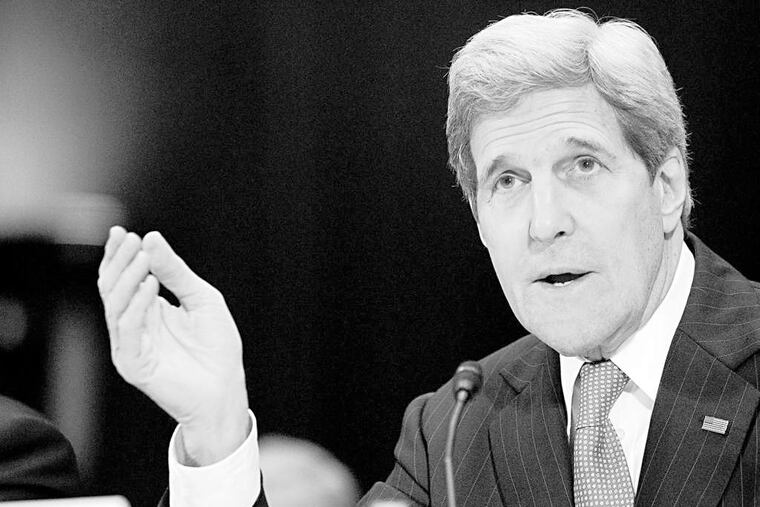Iran nuclear talks close in on deadline
LAUSANNE, Switzerland - Down-to-the-wire negotiations to restrict Iran's nuclear program and ease sanctions are ready to kick off under the pressure of a self-imposed deadline only two weeks away.

LAUSANNE, Switzerland - Down-to-the-wire negotiations to restrict Iran's nuclear program and ease sanctions are ready to kick off under the pressure of a self-imposed deadline only two weeks away.
Secretary of State John Kerry arrived in Lausanne on Sunday evening and was to meet with Iranian Foreign Minister Mohammad Javad Zarif on Monday. Other members of the U.S. negotiating team, including Wendy Sherman, undersecretary of state for political affairs, and Energy Secretary Ernest Moniz, arrived earlier.
After more than a decade of talks that gained momentum over the last year and a half, there is a last-chance feel to the latest round. The discussions have been stalled over the pace of sanctions relief, inspections, and the size of Iran's nuclear capacity.
The negotiations with Iran are being conducted by six world powers - the United States, France, Britain, Russia, China, and Germany. They have said that they want a framework for an agreement by the end of March. Kerry said, though, in a CBS interview that aired Sunday, that many of the technical differences already have been resolved.
"By and large, most of the differences now are political decisions that need to be made in order to fulfill the promise of proving to the world that a program is peaceful," he said in the interview, conducted Saturday in Egypt, where he was attending a regional economic conference.
The talks are being held against the backdrop of a political firestorm in Washington, after 47 Republicans sent an open letter to Iran's leaders warning that Congress would not necessarily go along with an agreement and that a future president could overturn it.
Kerry said a third extension of the interim deal is unlikely. "We believe very much that there is not anything that is going to change in April or May or June, that suggests that at that time, the decision you can't make now will be made then," he said.
Kerry is scheduled to be in Lausanne through Friday.
In other remarks in the CBS interview, Kerry said the U.S. is stepping up its diplomatic efforts to pressure Syrian President Bashar al-Assad into negotiations that could end, or decrease, the bloodshed in his country's four-year-old civil war, which has killed more than 220,000 people.
"We have had conversations with a number of different critical players in this tragedy - and it is a tragedy," Kerry said, though he did not specify with whom. "And we are working very hard with other interested parties to see if we can reignite a diplomatic outcome."
Kerry said the only solution to the strife in Syria is political, not military. Eventually, he added, the United States will have to negotiate with the Assad regime. State Department officials said that would not necessarily mean negotiating with Assad himself.